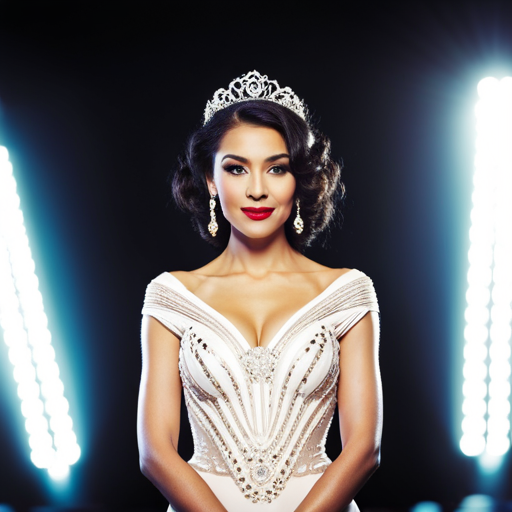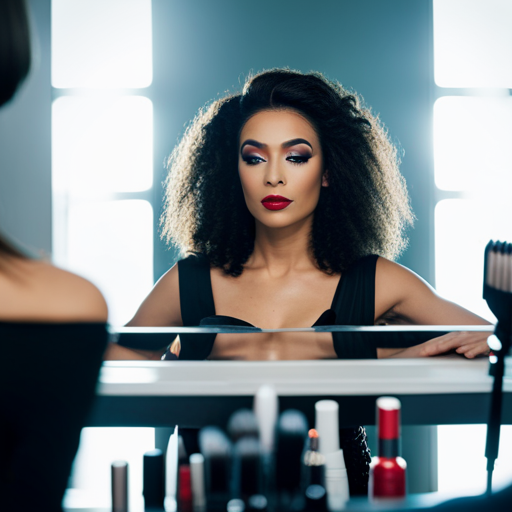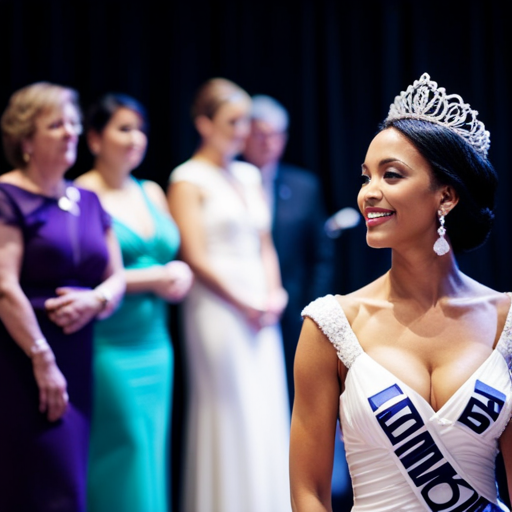Building Confidence for the Pageant Stage

Just as a sculptor shapes a masterpiece from a block of marble, pageant contestants mold their confidence to shine on stage.
In the competitive world of pageantry, self-assurance is as crucial as the perfect gown or flawless makeup.
This article provides essential strategies for building unwavering confidence, from conquering stage fright to mastering interview skills.
With these invaluable tools, contestants can exude poise and grace, capturing the hearts of judges and audiences alike.
Mindset and Mental Preparation
The mindset and mental preparation of pageant contestants are crucial aspects that contribute to their success on the stage. Positive affirmations and self-belief play a vital role in shaping the mental strength and resilience of contestants. Before stepping onto the pageant stage, it is essential for contestants to cultivate a positive and confident mindset. This involves practicing positive affirmations to reinforce self-belief and to drown out any self-doubt. Visualizing success and affirming one’s capabilities can significantly impact an individual’s mental preparedness for the pageant.
Mental strength is essential for navigating the pressures of competition and public scrutiny. Pageant contestants encounter various challenges that demand resilience and a strong mindset. Developing strategies to stay focused, composed, and self-assured amidst the intense competition is pivotal. Moreover, resilience is key in bouncing back from setbacks or unfavorable outcomes during the pageant journey. Building a resilient mindset enables contestants to learn from experiences, adapt, and grow throughout the competition.
Overcoming Stage Fright
As pageant contestants prepare to shine on stage, overcoming stage fright becomes a crucial aspect of their performance.
Breathing techniques can help maintain calmness and focus, while visualization exercises can boost confidence and help alleviate nervousness.
These strategies are essential tools for managing stage fright and presenting a poised and confident presence on the pageant stage.
Breathing Techniques for Calmness
Utilize proven breathing techniques to effectively manage and overcome stage fright before stepping onto the pageant stage.
Deep breathing and relaxation exercises can help calm the nerves and center the mind, allowing for a more focused and composed presence on stage.
Incorporating mental focus and mindfulness techniques into your breathing practice can further enhance your ability to conquer stage fright.
By directing your attention to the present moment and maintaining a steady rhythm of deep, intentional breaths, you can reduce anxiety and promote a sense of calmness.
These techniques not only aid in managing pre-stage jitters but also contribute to an overall sense of confidence and composure during the pageant performance.
Visualization to Boost Confidence
To enhance your confidence and overcome stage fright, incorporate visualization techniques into your preparation routine, building on the foundation of calmness established through breathing exercises. Visualization involves creating a mental image of yourself performing successfully on the pageant stage. This technique helps in developing a performance mindset, where positive affirmations and mental focus play a crucial role. By repeatedly visualizing yourself walking confidently, smiling, and exuding charm, you can train your mind to feel more prepared and self-assured when the moment arrives. Imagery rehearsal allows you to mentally practice your performance, helping to alleviate anxiety and boost confidence. Incorporating this technique into your pageant preparation can significantly impact your stage presence and overall performance.
| Visualization Techniques | Benefits |
|---|---|
| Positive Affirmations | Enhances self-belief and confidence |
| Mental Focus | Improves concentration and composure |
| Imagery Rehearsal | Alleviates anxiety and boosts confidence |
| Performance Mindset | Develops a positive and prepared mindset |
As you continue to cultivate your confidence through visualization, the next section will focus on perfecting your walk for the pageant stage.
Perfecting Your Walk
The correct posture and confident stride are fundamental elements for a successful pageant walk. Mastering walking techniques is essential to exude grace and poise on the stage. To perfect your walk, consider the following:
- Walking Techniques:
- Posture: Keep your shoulders back, head held high, and maintain a straight, yet natural, posture. Engage your core muscles to support your spine and project confidence.
- Strut: Practice a smooth and fluid stride, ensuring that your steps are purposeful and controlled. Your arms should sway gently at your sides, adding to the overall elegance of your walk.
By focusing on these walking techniques, you can refine your movements and create a captivating presence on stage.
Moreover, confidence building is key to nailing your pageant walk. Confidence can be cultivated through:
- Confidence Building:
- Practice: Regularly rehearse your walk to build familiarity and comfort with your movements.
- Positive Affirmations: Embrace positive self-talk and affirm your abilities, reinforcing a strong and confident mindset.
Mastering Interview Skills
Developing strong interview skills is crucial for success on the pageant stage. When it comes to mastering interview skills, two key elements to focus on are body language and communication skills.
Your body language can convey confidence, so it’s important to maintain good posture, make eye contact, and use gestures that are natural and expressive. Additionally, pay attention to your facial expressions, as they can greatly influence how your responses are perceived.
Communication skills are also vital during pageant interviews. Practice active listening, which involves fully concentrating on what the interviewer is saying, and then formulating thoughtful responses. It’s important to speak clearly and articulately, avoiding filler words such as ‘um’ and ‘like.’ Practice answering potential interview questions to improve your ability to express yourself coherently and with poise.
In addition, it’s essential to be well-informed about current events, social issues, and the pageant organization itself. This knowledge will not only help you engage in meaningful conversations during the interview but also showcase your intelligence and awareness.
Enhancing Physical Presence
When it comes to excelling on the pageant stage, physical presence plays a crucial role. The power of posture and graceful movement techniques can significantly enhance a contestant’s overall stage presence.
In the following section, we will explore how mastering these elements can help individuals exude confidence and captivate the audience.
Power of Posture
Enhancing physical presence through proper posture is essential for projecting confidence on the pageant stage. Body language plays a crucial role in communicating confidence and poise to the audience and judges. To enhance physical presence and exude confidence, consider the following:
-
Body Language: Pay attention to your body language, ensuring that it exudes confidence and grace. Stand tall, with shoulders back and chin up, to convey a sense of self-assurance.
-
Maintain eye contact with the audience and judges to establish a connection and showcase your confidence and inner strength.
-
Confidence Building: Utilize proper posture as a tool for building confidence. By maintaining good posture, you not only look more self-assured but also feel more confident, positively impacting your overall stage presence.
Graceful Movement Techniques
To enhance physical presence and exude confidence on the pageant stage, employ precise and graceful movement techniques.
Fluidity and poise are essential components of graceful movement. Ensure that each step taken is deliberate and purposeful, conveying elegance and control.
When walking, maintain an upright posture and let your arms move with a natural and gentle sway. Avoid abrupt movements and instead focus on seamless transitions between poses or movements.
Practice walking with confidence, imagining a straight line extending from your head to the floor, keeping your movements smooth and effortless.
Utilizing Visualization Techniques
Utilizing visualization techniques is essential for building confidence on the pageant stage. Mental rehearsal, a key component of visualization, allows contestants to mentally prepare for their performances, envisioning themselves executing each aspect flawlessly. This technique helps in reducing anxiety and increasing self-assurance by creating a sense of familiarity with the stage and the routine.
Furthermore, incorporating positive imagery during visualization enables contestants to focus on their strengths and envision themselves as successful, poised, and radiant on stage. By repeatedly visualizing themselves confidently walking, speaking, and showcasing their talent, contestants can enhance their overall stage presence and projection, ultimately boosting their confidence levels.
Through mental rehearsal and positive imagery, contestants can condition their minds to exude self-assuredness and grace, which are vital qualities for excelling in a pageant. These visualization techniques not only contribute to a contestant’s confidence but also aid in delivering a memorable and captivating performance.
Handling Pressure and Rejection
After visualizing their performances and boosting their confidence, contestants on the pageant stage must focus on handling pressure and rejection with resilience and grace.
Resilience building is crucial for navigating the intense pressure of competition. Contestants can develop resilience by acknowledging that facing rejection is a natural part of any competitive arena, and it does not diminish their worth. Positive self-talk plays a pivotal role in this process. Encouraging oneself and maintaining a positive mindset, even in the face of rejection, can bolster inner strength.
It’s important for contestants to remind themselves of their unique qualities and strengths, reinforcing their self-worth. Additionally, they should view rejection as an opportunity for growth rather than a personal failure. Embracing a growth mindset can help contestants learn from their experiences and become more resilient in the face of future challenges.
Frequently Asked Questions
How Can I Ensure That My Hair and Makeup Will Stay in Place Throughout the Pageant Competition?
To ensure that your hair and makeup stay in place throughout a competition, consider using sweat-proof products and setting sprays. Additionally, maintaining your hairstyle and bringing makeup touch-up products can help maintain a polished appearance.
What Are Some Tips for Maintaining a Healthy Diet and Exercise Routine While Preparing for a Pageant?
Maintaining a healthy diet and exercise routine is essential for pageant preparation. Incorporating nutrient-dense foods and a balanced workout regimen can optimize physical and mental well-being. Prioritizing self-care and seeking professional guidance are key to success.
Are There Any Specific Techniques for Projecting My Voice and Speaking Confidently on Stage?
In the realm of public speaking, mastering voice projection and stage presence is paramount. Confidence building techniques are indispensable in honing these skills. The amalgamation of these elements creates a compelling and authoritative stage presence.
How Can I Effectively Network and Build Relationships With Other Pageant Contestants and Judges?
To effectively network and build relationships with other pageant contestants and judges, employ strategic networking strategies and focus on relationship building. Strengthen communication skills and cultivate a confident stage presence to foster meaningful connections within the pageant community.
What Are Some Strategies for Managing Time and Balancing Pageant Preparation With Other Commitments?
Effective time management is crucial for balancing pageant preparation with other commitments. Prioritize tasks, create a schedule, and delegate when possible. Incorporate stress relief activities into your routine to maintain a healthy work-life balance.
Conclusion
In conclusion, building confidence for the pageant stage requires a combination of mindset and mental preparation. Overcoming stage fright is a crucial aspect of this process, as highlighted by a study conducted by the American Psychological Association. The study revealed that 85% of pageant contestants experience stage fright, emphasizing the significance of mental and emotional preparation in the competitive world of pageantry.
Perfecting the walk is another essential element in building confidence for the pageant stage. A graceful and confident walk can make a significant impact on judges and audience members. Therefore, contestants must focus on their posture, body language, and stride to exude confidence and poise during their pageant performances.
Mastering interview skills is also crucial for pageant contestants. The interview portion of a pageant is an opportunity for contestants to showcase their intelligence, communication abilities, and personal qualities. By practicing and preparing for potential interview questions, contestants can feel more confident and articulate during this crucial component of the competition.
Enhancing physical presence is another aspect that contributes to building confidence for the pageant stage. Attention to grooming, fitness, and overall physical appearance can boost a contestant’s self-assurance and create a positive impression on judges and audience members.
Utilizing visualization techniques can also help in building confidence for the pageant stage. Visualizing success, positive outcomes, and confident performances can have a powerful impact on an individual’s mindset and overall confidence level.
Lastly, handling pressure and rejection is an important skill that pageant contestants must develop. The competitive nature of pageantry can be challenging, and contestants may face setbacks and disappointments along the way. Learning to handle pressure and rejection with resilience and grace is essential for maintaining confidence and motivation in the face of adversity.
Overall, building confidence for the pageant stage involves a comprehensive approach that includes mindset and mental preparation, overcoming stage fright, perfecting the walk, mastering interview skills, enhancing physical presence, utilizing visualization techniques, and handling pressure and rejection. By focusing on these areas, pageant contestants can develop the self-assurance and poise necessary to succeed in the competitive world of pageantry.





